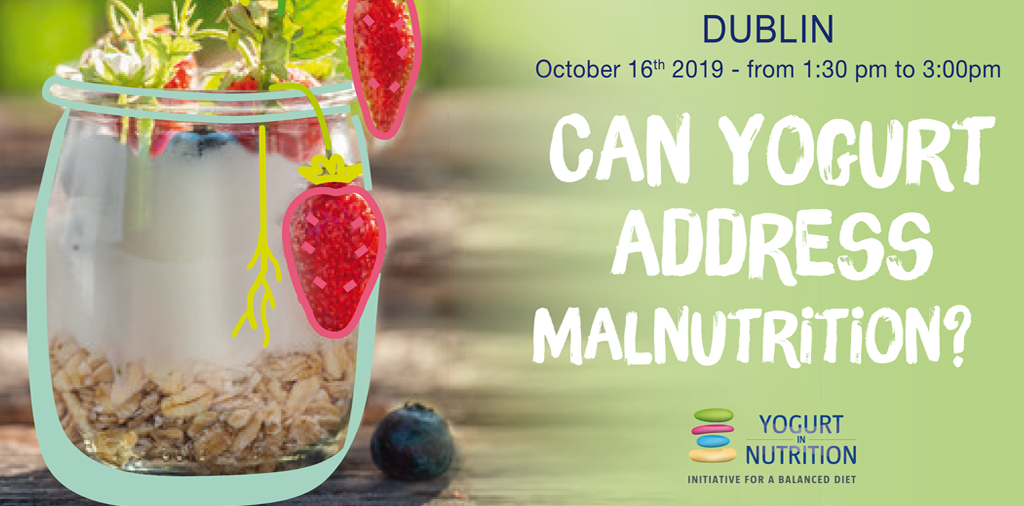In a global context where obesity, diabetes, and other non-communicable diseases (NCD) are spreading, the question of adequate nutrition is key. How to address malnutrition? Are there specific foods that can be particularly interesting? How to deal with nutrition and sustainability?
Those are some of the questions that Barbara Rolls (Pennsylvania State University, USA), Angelo Tremblay (Laval University, Canada) and Frans Kok (Wageningen University, the Netherlands) have addressed during the YINI Symposium, organized on Wednesday 16th of October, during the FENS 2019, in Dublin, Ireland.
Yogurt can be a versatile and satiating food for weight management
To begin the symposium, Dr Barbara Rolls analyzed the role that yogurt could play to manage excess intake of nutrient-poor foods.
Yogurt is nutrient-rich compared to many foods and this richness in a number of nutrients can improve diet quality. It can be eaten in many different contexts. However, its sensory properties and nutrient composition can vary considerably. This versatility in terms of nutrient and organoleptic properties has provided scientists with opportunities to explore its effects on both satiety and body weight.
Dr Rolls focused her presentation on the satiating role of yogurt: is it more satiating than other foods? Which properties affect satiety? How can it be incorporated into the diet to promote weight management?
Dr Barbara Rolls reviewed some of the findings on satiety that have emerged from studies using yogurt. They help to explain why eating yogurt is associated with reduced weight gain over time as shown in population-based data.
Many factors influence how yogurt affects satiety, satiation, and intake:
- Sensory properties, as better liked foods are often eaten in greater amounts
- Physical properties, that can slow eating rate and therefore reduce intake
- Macronutrient composition
- Expectations, which can affect intake more than actual composition
- Energy density, which may have a critical influence on satiety, satiation or intake.
Current theories include effects of yogurt on intestinal absorption, gut microbiota, and inflammation.
In practice, yogurt remains quite low in energy density. Therefore, swaping energy-dense foods with yogurt can allow to enjoy bigger portions or to manage calories, while improving the nutrient density of the diet.
The take-home messages from Dr Rolls:
- Yogurt has been found to be more satiating than some other foods
- Studies with yogurt indicate that slowing eating rate and lowering energy density can enhance satiety and reduce energy intake
- Yogurt provides a number of nutrient-dense options that can be substituted for more energy-dense foods to manage intake
Beyond nutrient-density
After this global focus made by Dr Rolls, it was interesting for Pr. Angelo Tremblay to study the impact of yogurt consumption beyond nutrient density.
Indeed, beyond their nutrient content, some foods have additional properties that also contribute to health benefits. This is the case for yogurt.
According to Prof. Tremblay, yogurt has a flexible matrix that permits manipulations favoring body functionality, like a supplementation of dietary fibers to facilitate appetite control.
Yogurt is also a fermented food with living culture bacteria that may explain some health benefits of yogurt consumption. It is recognized for example that live yogurt cultures improve digestion of lactose in individuals with lactose maldigestion (cf. EFSA Journal 2010, 10(8): 1763). Prof. Tremblay presented also data from a research experience, which demonstrates that yogurt consumers display a more favorable plasma glucose and insulin profile than non-consumers, even after adjustment for food nutrient density.
Finally, the idea has been proposed that yogurt consumption is a signature of a healthy lifestyle. This is well exemplified by the fact that yogurt consumers are less prone to smoking and more engaged in a physically active lifestyle. In summary, yogurt appears as a healthy food that counteracts malnutrition and that promotes metabolic health.
For Prof. Tremblay, beyond nutrient-density, yogurt:
- Offers a flexible food matrix
- Contains bacterial cultures and is relevant for probiotic supplementation
- Promotes health benefits in vulnerable individuals and appears as a signature of a healthy lifestyle
Can yogurt be a sustainable food choice?
If yogurt may have interesting assets to address malnutrition through its nutrient-density, fermentation properties, effects on NCD, can it still have its place in actual diets where sustainability is key?
This was the point addressed by Prof. Frans Kok.
According to the Eat Lancet paper, published early this year, specific schifts are needed to stay within food production boundaries and still deliver healthy diets in 2050 : dietary shifts to a predominanlty plant-based diet, production practices evolution, reduced food waste.
However, analysing the studies available, Frans. Kok showed that most of the results (mostly country-specific) indicate that dairy are part of sustainable diets. Even if dairy protein causes greater emissions than a combination of vegetables and cereals, modelling studies find that by retaining dairy products in the diet, it’s easier to meet nutritional needs of the population than through plant-based foods alone.
The reductions in Greenhouse gases of 20-30% through our diet by 2030 are achievable to limit global temperature rise to below 2°C (cf. Paris Climate Agreement). For this purpose, the EAT LANCET report is recommending a health planetary plate composed at 50% by plant-based foods, with a high reduction of meat and a limitation of dairy products.
However, for Frans Kok:
- Solutions needs to be local
- A reduction rather than elimination approach may be more effective in dietary guidelines for environmental impacts.
- Existing data show that a daily intake of milk or derivative equivalents still fits in sustainable and healthy diets, with a special interest for yogurt because of its nutrient richness, low fat content and vehicle of ferments.
- However, more studies are necessary to quantify its environmental impact.



